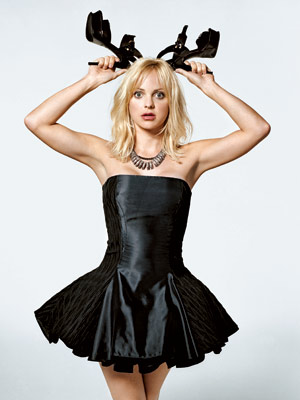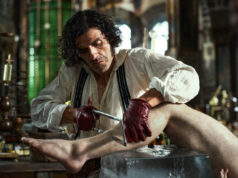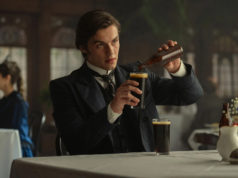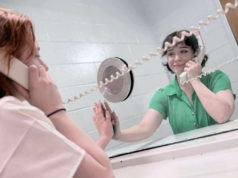I spent Saturday watching Anna Faris host a pretty good episode of Saturday Night Live that she didn’t contribute much to. Coming on the heels of What’s Your Number?, which is rapidly and deservedly fading from our movie theaters, this is the latest chapter in a puzzling career that I still have hope for.
Of course, I’m hardly the first to this territory. Film critics and feature writers have been going round and round with this for years. Why isn’t she more famous? She’s young, gorgeous, and terribly funny. She fully commits to everything she does — I remember seeing her in Scary Movie 4 and being impressed with how hard she was working the lame jokes. She won’t take the “token girl in blockbuster action-movie” roles. Even though she looks good naked, she won’t get naked in movies unless it’s for purely comedic purposes (which happens in both What’s Your Number? and a very funny bit in The House Bunny).
She’s likable, too. Part of that is Faris’ voice, which is nasal and cracked and too loud in spots. Most movie stars have voices that match their looks; hot women with weird voices tend not to make the A-list (think Courteney Cox and Anne Heche), but tend to have long careers because their voices make them seem more down-to-earth and relatable. Faris’ doll-like eyes seem to register continual dazed wonder at the obstacles that the world keeps throwing in her characters’ way. She radiates a goofball sort of innocence that makes her winning even in potentially unlikable roles.
And yet she hasn’t had anything like the career of Drew Barrymore, a similar and (I would argue) less talented actress who is about 18 months older than Faris and yet has a string of box-office successes behind her and is now a producer and director in her own right. So why has Faris’ career as a leading lady struggled to get out of the blocks? Sexism makes for a handy argument; there is evidence to suggest that Hollywood is uncomfortable with women headlining comedies that aren’t easily pigeonholed as romantic comedies. Surely that was the point of the New Yorker profile of Faris this past spring, which unfortunately I can’t link to because it’s behind a subscription wall. Undoubtedly she’s had to deal with static that her male counterparts haven’t been bothered with. Yet I don’t think that’s the whole story.
At what point do we blame Faris herself? Nobody wants to do this because she’s so gosh-darned likable, offscreen as well as on. Yet if you check out her IMDb page, her track record hits you in the face. There’s a lot of stinkers there. Even allowing for her loyalty to the Scary Movie series that launched her career and some other early roles she might well have taken to get work (like 2002’s The Hot Chick, which also starred a pre-fame Rachel McAdams), you’re still staring down movies that had limited release (Mama’s Boy), movies that got held up in release (Take Me Home Tonight), movies that went direct to DVD (Smiley Face), and stuff so horrible that it shouldn’t have been released at all (My Super Ex-Girlfriend). Her work in kids’ movies (voiceover work in the Alvin and the Chipmunks films and a flesh-and-blood performance in Yogi Bear) are enough to make you think she might have been better off as a token girl in a good blockbuster action flick.
Aside from the medium-sized hit The House Bunny, what do we have? One dazzling performance in Observe and Report, which flopped because audiences weren’t yet ready to see leading man Seth Rogen in such a different role. A turn as a psychotic rock star in Just Friends, which she stole clean away from Ryan Reynolds, no easy feat. And then we have that strange and wonderful blip in the early 2000s when she caught the eye of major directors Sofia Coppola (in Lost in Translation) and Ang Lee (in Brokeback Mountain), two essentially lyrical films that used her for comic relief and got a huge jolt from her presence. It’s tempting to view that as a road not taken, and yet these silly, lowbrow comedies that she’s currently doing seem to be where she’s most at home. I’d certainly rather see her in one of those than acting for Terence Malick or Lars von Trier. Picking the right projects is as important to any acting career as what an actor does in performance. It seems that Faris is much better at choosing roles than scripts. She knows where her own strengths lie, but on the evidence, she’s not a good judge of material.
So where does she go from here? She’s one of dozens of movie stars participating in an anthology film called Movie 43 out next year, and she has the lead opposite Sacha Baron Cohen in a political satire called The Dictator that might get her act into a different arena without damaging it. She turns 35 this year. The clock is ticking, but it isn’t too late by any means. Look at Kristen Wiig, who shared the stage with Faris this weekend on SNL. She was in much the same predicament this time last year, and look where she is now. Of course, Wiig co-wrote a great comedy for herself. Faris is trying to make opportunities for herself rather than sit around and mope about it, but unless she has a hidden talent for screenwriting, she may well need outside help to get that elusive breakthrough.
Remember what I said earlier about Faris redeeming unlikable characters? If you want to see a terrific Anna Faris performance in a whole different vein, check her out in the incredibly disturbing 2002 slasher flick May. She portrays Polly, a co-worker who seduces the titular heroine (played by Angela Bettis) and then has a different woman in her bed the very next day. Polly’s not even embarrassed when May discovers her with the other woman, and invites May to join them. (That’s sweet of her, I guess.) Faris makes the role bewitching, playing the shallow, amoral Polly as someone who freely indulges her own impulses and can’t imagine why May or anybody else would be upset at the infidelity. May is upset, and she becomes a serial killer. Yet even then you root for Polly not to be one of May’s victims because of the ditzy innocence that Faris gives the role. The love and trust she gives to Polly’s last line of dialogue is truly haunting.












